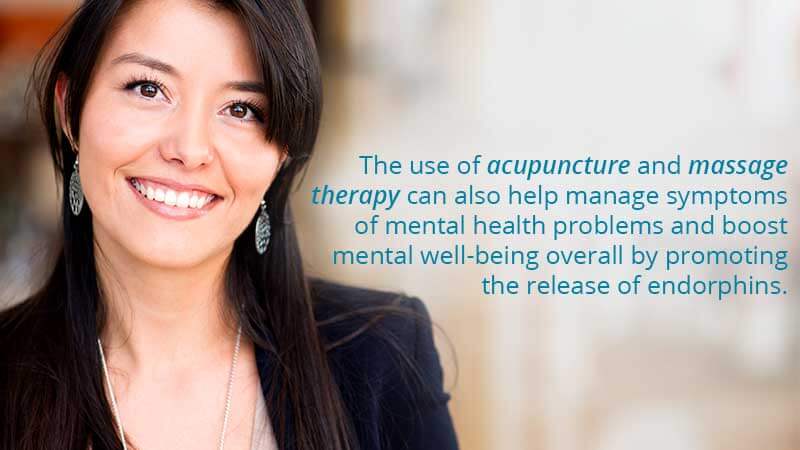With a stronger emphasis on safely and effectively managing mental health problems, the use of conventional treatment methods has been a cause of concern for some. The use of prescription drugs, such as antidepressants and anti-anxiety medications, can put those who take them at risk of experiencing side effects.
Other conventional treatment methods, such as therapy, are not always effective enough to manage symptoms of these disorders. Alternative forms of medicine, including massage therapy and acupuncture, have been gaining popularity among those who want a more natural treatment method. These types of treatments offer important benefits for those who struggle with mental health problems.
Benefits of Acupuncture on Mental Health
Both acupuncture and massage therapy have shown promise in benefiting mental health in several ways:
Stress Reduction
Both therapies can help reduce stress by regulating the body’s stress response by promoting the release of neurotransmitters like endorphins, which induce relaxation.
Anxiety and Depression
Studies suggest that acupuncture and massage therapy can alleviate symptoms of anxiety and depression. They may modulate the levels of certain neurotransmitters, promoting a more balanced mental state.
Improved Sleep
People undergoing acupuncture or massage therapy often report better sleep quality. By addressing imbalances in the body, it can help regulate sleep patterns.
Pain Management
Chronic pain often coexists with mental health issues. Acupuncture’s and massage therapy’s ability to alleviate pain can indirectly improve mental health by reducing discomfort and improving overall well-being.
Stress Relief
Acupuncture and massage therapy have been shown to provide effective forms of stress relief. This can help improve emotional and mental well-being and ease symptoms associated with specific mental health disorders, such as anxiety and depression.
These forms of alternative medicine are able to relieve stress that builds up inside over time. As stress builds up, it can cause physical symptoms that contribute to mental health issues, including increased heart rate and more rapid breathing.
Acupuncture and massage relieve stress by restoring a healthy flow of energy, or qi, throughout the body. Acupuncture does so through the use of needles placed in specific parts of the body, while massage therapy targets certain muscles and other parts of the body in order to relieve tension.
Hormonal Changes
The use of acupuncture and massage therapy can also help manage symptoms of mental health problems and boost overall well-being by promoting the release of endorphins. These are hormones produced by the brain that cause positive and pleasant feelings.

An increase in endorphins can provide an emotional boost and improve mood, which can help those who have mood disorders, such as depression or anxiety. Acupuncture and massage therapy also help by lowering the amount of cortisol, a stress hormone, in the body.
Safety and Effectiveness
Acupuncture and massage therapy offer safe and effective treatment alternatives for those who do not want to risk having side effects or adverse reactions to drugs used for mental disorders. These forms of alternative medicine can also work more quickly and effectively than therapy for those who have mental health issues.
Acupuncture does involve the use of needles, but these are very thin and used safely when they are inserted. Both massage therapy and acupuncture have very low risks of side effects, such as soreness, and are safe for most people.
Bottom Line
Both acupuncture and massage therapy offer complementary approaches to improving mental health by reducing stress, alleviating symptoms of anxiety and depression, enhancing mood, and promoting better sleep. These alternative therapies can be used alongside traditional treatments for holistic well-being.
If you have an interest in making acupuncture or massage therapy your career, contact the American Institute of Alternative Medicine. We also encourage you to schedule a tour of our campus.
Frequently Asked Questions
Is acupuncture painful?
Acupuncture is generally painless, with most people experiencing minimal to no discomfort. The sensation may be a slight tingling or dull ache at the insertion site of the needles.
How often should one get acupuncture or massage therapy for mental health benefits?
The frequency of sessions varies depending on individual needs. Some may benefit from weekly sessions initially, while others may find monthly appointments sufficient.
Are there any risks associated with acupuncture or massage therapy?
When performed by a trained professional, both therapies are generally safe. However, some risks, such as minor bruising or soreness, might occur. It’s essential to seek these therapies from licensed and experienced practitioners to minimize risks.
Can these therapies replace traditional mental health treatments?
They can complement traditional treatments but should not replace them entirely. Consulting with a healthcare professional is crucial for a comprehensive treatment plan.
These therapies offer promising avenues for improving mental health, but individual experiences may vary. Consulting with a healthcare provider to explore suitable options is advisable.